|
|
|
Sort Order |
|
|
|
Items / Page
|
|
|
|
|
|
|
| Srl | Item |
| 1 |
ID:
160672
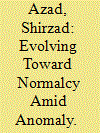

|
|
|
|
|
| Summary/Abstract |
North Korea's engagement in the Middle East is a six-decade long narrative. Neither the DPRK nor its Middle Eastern partners have remained still over this time; each region has undergone significant changes. In particular, the leadership of the North Korea is now in the hands of the third generation. No matter how stagnant and monolithic the country may seem at first sight, each generation has had to deal with differing commitments and adapt to changing realities. As such, each generational change of leadership in Pyongyang has arguably had repercussions on the DPRK's relationship Middle Eastern partners, which may at times have been misattributed to a fundamental change of approach. This study attempts, therefore, to probe the twists and turns in the DPRK's interactions with the Middle East since the death of Kim Il-sung, beginning with an appraisal of each leaderships’ priorities in North Korea, and how they could potentially influence Pyongyang's overall orientation toward its different partners in the region.
|
|
|
|
|
|
|
|
|
|
|
|
|
|
|
|
| 2 |
ID:
174664
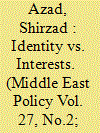

|
|
|
|
|
| Summary/Abstract |
Since the ascendancy of the Justice and Development Party (AKP) in 2002, Turkey has critically reappraised its foreign‐policy priorities. Led by President Recep Tayyip Erdoğan, the Turkish political establishment has reset its conventional pattern of foreign‐policy behavior by distancing the country from the West in favor of better connections to other regions. Turkey has not abandoned its long‐cherished aspiration of European Union (EU) membership, but its top leadership has demonstrated that the Turks are no longer willing to pay any demeaning cost in order to achieve that erstwhile goal. Moreover, Turkish leaders have sometimes even gone out of their way to criticize certain Western politico‐economic as well as cultural policies, no matter that their country is still an active member of the North Atlantic Treaty Organization (NATO).
|
|
|
|
|
|
|
|
|
|
|
|
|
|
|
|
| 3 |
ID:
188437
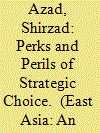

|
|
|
|
|
| Summary/Abstract |
After some two decades of growing partnership between Seoul and Tehran, South Korea’s bilateral relationship with Iran reached a bottom of absolute gloom under the leadership of Moon Jae-in. Most of his presidency coincided with the administration of Donald Trump who followed a relatively contrasting approach toward the North Korean and Iranian nuclear issues. Washington’s Pyongyang and Tehran policies were naturally bound to create opportunities as well as troubles for the Moon-led Korean government’s dealing with North Korea and Iran. Arguing from a perspective of strategic choice, this study asserts that Moon almost forfeited the ROK’s commercial interests in Iran for the sake of advancing his North Korean agenda. As a corollary, the South Korean–Iranian ties sank to an all-time low, culminating in unprecedented diplomatic tensions between the two countries over the issue of Iran’s oil incomes frozen in Seoul. The Mideast country’s subsequent resort to gunboat diplomacy by seizing a Korean oil tanker in the Persian Gulf did also little to break the gridlock over the dilemma of blocked assets because any satisfactory and lasting solution regarding this intractable trouble largely hinged on resolving the fate of Iran’s nuclear deal between Tehran and Washington.
|
|
|
|
|
|
|
|
|
|
|
|
|
|
|
|
| 4 |
ID:
168612


|
|
|
|
|
| Summary/Abstract |
As a critical orientation in Saudi Arabia’s interactions with the outside world, ‘looking East’ has breathed new life into the Arab country’s rather mundane and modest foreign policy, long characterised by strong attachment to Western countries, the United States in particular. Despite their explicit intention not to replace pivotal Western allies with Asian partners, the Saudis have fostered closer connections to the East virtually in every area, covering politico-strategic, military, economic, technological, and cultural spheres. The Saudi looking-East drive has, moreover, dovetailed neatly with an equally salient approach among major Asian nations to advance their vastly expanding interests in important Middle East countries.
|
|
|
|
|
|
|
|
|
|
|
|
|
|
|
|
| 5 |
ID:
158058
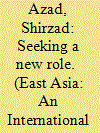

|
|
|
|
|
| Summary/Abstract |
With his frequent travels to the Middle East, more than all other Japanese leaders in the past, Shinzo Abe had been destined to ineluctably play a distinctive role in redefining his country’s foreign policy approach toward the region. Essentially, when Abe returned to power for a second time in late 2012, he succeeded to subsequently establish a relatively stable and long-term government which strived to critically reappraise some highly contentious elements of Japan’s internal and external policies. Reassessing Japan’s conventional low-profile orientation to the Middle East was particularly a major objective of the Abe government because the region had turned out to be closely and dubiously connected to some pivotal political and security reforms which Abe had long pursued to achieve domestically. By primarily doubling down Japan’s political engagement in different parts of the Middle East, therefore, Abe took advantage of what his country had capitalized in the region in more recent times to especially accelerate the accomplishment of some other political and security he favored ardently.
|
|
|
|
|
|
|
|
|
|
|
|
|
|
|
|
| 6 |
ID:
171049
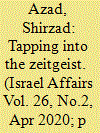

|
|
|
|
|
| Summary/Abstract |
Its close alliance with the West over the course of seven decades notwithstanding, Israel has embarked on an East-looking orientation during the past several years. Aiming to cultivate multifaceted connections to various Asian countries, the new Israeli approach has striven to enhance the Jewish state’s relationship with the East in the political, military, economic, financial, technological, and cultural spheres. For their part, many Asian states have displayed a keen desire to expand their growing interactions with Israel, smoothing the way for the success of Israel’s East-looking drive.
|
|
|
|
|
|
|
|
|
|
|
|
|
|
|
|
| 7 |
ID:
189532


|
|
|
|
|
| Summary/Abstract |
Although the contemporary trajectory of South Korea’s rather multifaceted connections to Iran is a six-decade-long narrative, a great deal of its staggering successes and sobering setbacks took place just over the past decade and a half, coinciding with the ebbs and flows in the Iranian nuclear issue. The Korean policy response toward the sundry international sanctions levied against Iran in the wake of its contentious nuclear program played an indispensable role in the East Asian nation’s substantially fluctuating relationship with the Iranians in political, economic, technological, and cultural areas. The Koreans could outstrip almost all of their Western and Eastern rivals in Iran when they made it possible for the latter to secure parts of its badly needed economic and technological requirements denied to Tehran because of certain international impediments and restrictions, but the Korean omnipresence throughout the Iranian society set on a swift downward slope as soon as the East Asian state was no longer able to keep serving those sanctioned interests.
|
|
|
|
|
|
|
|
|
|
|
|
|
|
|
|
|
|
|
|
|